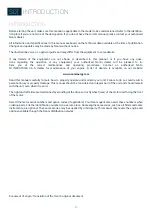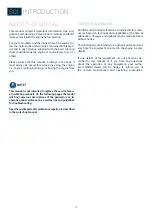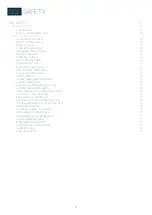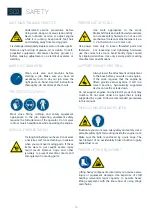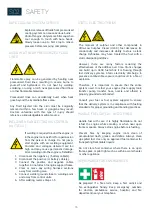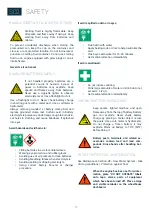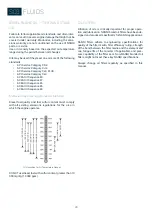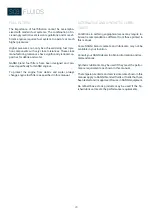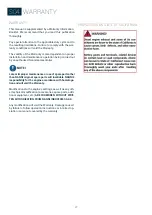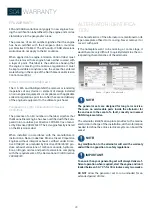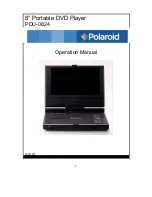
22
S03
FLUIDS
HANDLING AND STORING DIESEL FUEL
CAUTION !
Reduce the risk of fire. Handle fuel carefully. DO NOT
fill the fuel tank when engine is running. DO NOT smoke
while you fill the fuel tank or service the fuel system.
Fill the fuel tank at the end of each day’s operation to pre
-
vent water condensation and freezing during cold weather.
Keep all storage tanks as full as practical to minimize
condensation.
Ensure that all fuel tank caps and covers are installed
properly to prevent moisture from entering. Monitor water
content of the fuel regularly.
When using biodiesel fuel, the fuel filter may require more
frequent replacement due to premature plugging.
Check engine oil level daily prior to starting engine. A ris-
ing oil level may indicate fuel dilution of the engine oil.
IMPORTANT!
The fuel tank is vented through the filler cap. If a new filler
cap is required, always replace it with an original vented
cap.
When fuel is stored for an extended period or if there is a
slow turnover of fuel, add a fuel conditioner to stabilize
the fuel. Keeping the free water drained and treating the
bulk fuel storage tank quarterly with a maintenance dose
of a biocide will prevent microbial growth. Contact your
fuel supplier or NANNI dealer for recommendations.
RECOMMENDED FUEL
Approved fuel
Diesel approved by NANNI Industries on the engines of
the firm are as follows :
•
EN 590 (Europe),
•
ASTM D975 (U.S.A and territorial waters assim
-
ilated, particularly in the Caribbean and Pacific
areas),
•
BS 2869 Part 1 Class A1 (G.B),
•
JIS KS2204 Fuel N°02 (Japan).
These regulations are in compliance with ISO 8217 DMX.
European standard EN15940
Paraffin-based fuel that complies with European stand
-
ard EN15940 can be used for all NANNI Kubota bases en
-
gines including EU Stage V.
The newly approved fuels are paraffin-based fuels that
comply with European standard EN15940, including GTL
(Gas to Liquid) and HVO (Hydrotreated Vegetable Oil).
Paraffinic fuels are produced from natural gas, coal, veg
-
etable oil, animal, and vegetable fats, etc., and their main
component is paraffin.
Fuels synthesized from vegetable oils and fats are called
HVO, and fuels synthesized from natural gas are called
GTL.
IMPORTANT!
When using these fuels, please comply with the various
regulations in the area where it is used.
EN15940 (Effect on engine)
CAUTION !
1.
Paraffinic fuel is lower fuel density than diesel, so en
-
gine output may decrease.
2. Rubbers and elastomers used in engine parts, such
as NBR, may harden and shrink more than diesel.
Содержание Q1500 Series
Страница 1: ...NANNI GENERATOR SET USER MANUAL DGBXXT090049 Q1500 Series...
Страница 2: ......
Страница 4: ...4 Q00 TRACKED CHANGES...
Страница 8: ...8 S00 SUMMARY...
Страница 32: ...32 S03 FLUIDS...
Страница 38: ...30 S05 COMPOSANTS...
Страница 40: ...32 S05 COMPOSANTS VIEW N 1 OF THE GENERATOR SET...
Страница 41: ...33 S05 COMPOSANTS VIEW N 2 OF THE GENERATOR SET...
Страница 52: ...52 S 07 MAINTENANCE Battery voltage 72 Battery specific gravity 72...
Страница 53: ...53 S 07 MAINTENANCE...
Страница 74: ...74 S 07 MAINTENANCE...
Страница 76: ...76 S08 AL TERNATOR...
Страница 88: ......
Страница 96: ...96 S11 TROUBLE SHOOTING...
Страница 97: ......
Страница 98: ......


